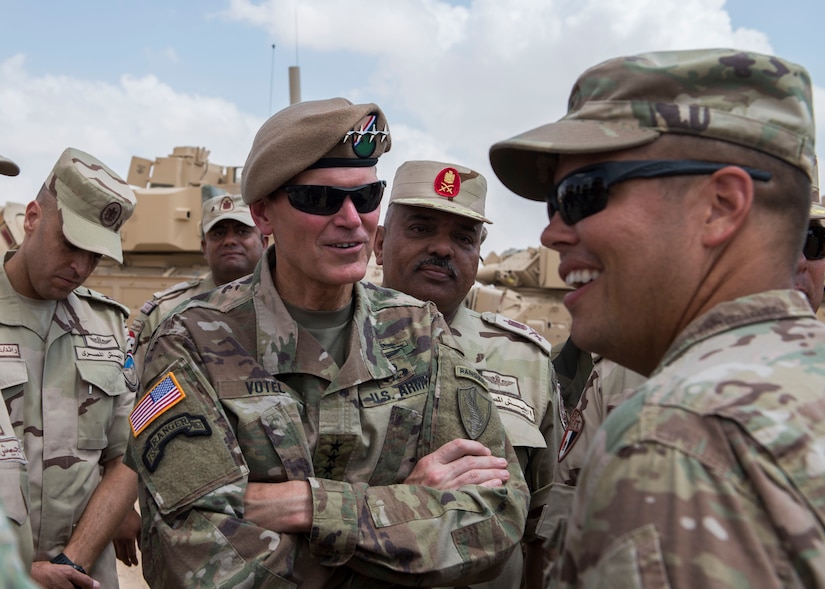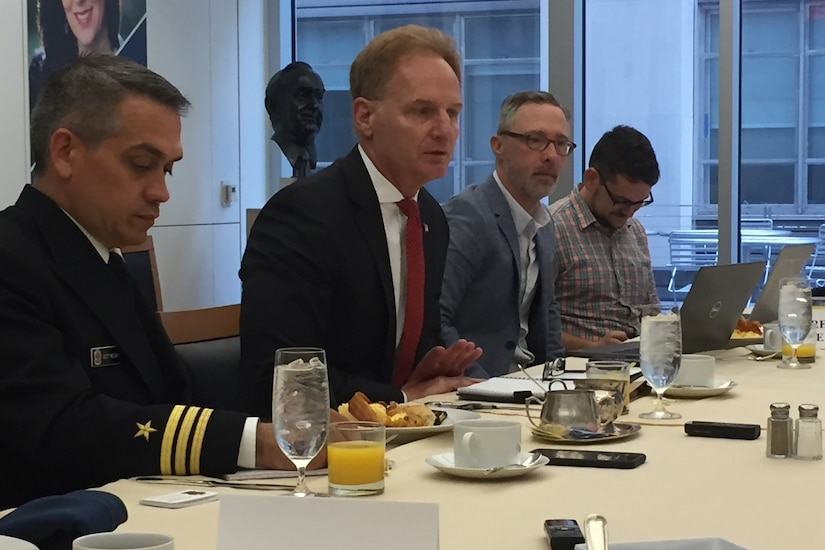By Jim Garamone, DoD News, Defense Media Activity
WASHINGTON -- Afghanistan, Iraq, Syria, Yemen and Iran are
just a few of the hotspots the commander of U.S. Central Command spoke about
this morning as he discussed the range of operations in the area during a
Pentagon news conference.
Army Gen. Joseph Votel spoke to reporters from Centcom
headquarters at MacDill Air Force Base, Florida, via teleconference. He
reported on his recent 19-day trip through the area of operations.
Votel began with Afghanistan, where he officiated as Army
Gen. John Nicholson turned command of the Resolute Support Mission over to Army
Gen. Scott Miller on Sept. 2.
The fight in Afghanistan is tough and Afghan forces are
suffering higher casualties than they did last year, he said. Still President
Donald J. Trump’s South Asia Strategy is sound, Votel said, and Miller is
assessing conditions and making tactical improvements that he deems necessary.
The strategy is conditions based, the general noted, and is
focused on achieving reconciliation and stability through military, political
and social pressure. There is no set end date, and coalition countries are
committed to Afghanistan. The Taliban's strategy of waiting the coalition out
will not work, he said. Reconciliation with the Afghan government is the only
smart choice for the group.
However, there will be no reconciliation with groups such as
al-Qaida and the Islamic State of Iraq and Syria offshoot ISIS-Khorasan, Votel
said. “We remain committed to methodically and unrelentingly rooting out and
eliminating ISIS-K fighters,” he said. “We continue to work with the Afghan
national defense and security forces to develop the capabilities needed to
seize and retain the initiative against the Taliban, and to effectively counter
ISIS-Khorasan. While this has been a difficult and bloody summer, especially
the last several weeks, we are seeing some improvements.”
He praised Afghan troops for allowing their fellow citizens
to celebrate a peaceful Shiite holiday of Ashura. Afghan forces are also
securing the country for legislative elections later this month. “The taste for
peace and reconciliation remains strong following this summer's cease-fire, and
we continue to see local reconciliation initiatives around the country,” the
general said.
Even as Afghan forces take the fight to the enemy, the
training effort continues.
Iraq, Syria
Votel turned to Iraq and Syria. In Iraq, national forces
operate independently and they are conducting offensive operations against the
remnants of ISIS, he said.
In Syria, local forces “continue to make steady progress in
liberating the final remnants of ISIS's physical caliphate,” the general said.
Votel said things are looking up, especially when considered
against how far the effort against ISIS has come from 2014, when the terror
group was banging on the doors of Baghdad and they had declared a physical
caliphate from its “capital” in Raqqa, Syria.
Still, no one should be complacent, he said. “While the
territorial defeat of ISIS in these areas is an important milestone, the
lasting defeat of ISIS is our ultimate objective,” the general said.
“In Iraq, we are committed to a responsible presence, at the
invitation of the government, to continue our support to the Iraqi security
forces and ensure a lasting defeat of ISIS,” Votel said. “In Syria, we will
remain with our partners to ensure the defeat of ISIS and provide an
opportunity for a negotiated political resolution of the Syrian conflict and
humanitarian crisis, consistent with United Nations Security Council Resolution
2254.”
Countries have ponied up for stabilization efforts in both
Syria and Iraq, and that is encouraging, he said. “We continue to advocate for
greater global burden sharing as part of our ongoing defeat-ISIS military
operations, stabilization and humanitarian assistance,” the general said.
But on the other hand, Votel said, Russia and Iran continue
to “exacerbate” the seven-year civil war in Syria. Without those two countries,
he said, Syrian leader Bashar Assad would have long been deposed.
Votel called Iran “the world's leading sponsor of terror”
and says its malign efforts continue to destabilize nations around the region.
“None of these activities are helpful or supportive of peace and stability, and
all introduce greater risk to an already complex and volatile environment,” he
said.
Nations in the region – to include members of the Gulf
Cooperation Council and Egypt and Jordan – are working together to combat
Iranian efforts, the general said. Votel highlighted the growing cooperation
and collaboration on integrated air and missile defense, maritime security and
countering terrorism among the nations in the region. “And we all committed to
moving forward together in these three areas,” he said.
Yemen
Votel also visited Yemen during his trip, which, he said “is
suffering from a toxic combination of civil war, terrorism and malign influence
that not only threatens the existence of its people, but also adds to
instability in the region and threatens our national interests.”
The general is working closely with United Nations Special
Envoy Martin Griffiths on Yemen. “Our interactions with members of the Saudi
coalition are focused on providing [Griffiths] the maximum opportunity to bring
the warring parties to consultative negotiations aimed at a political
solution,” Votel said.
Through all this, he said, Iran continues to export
missiles, rockets and unmanned aerial systems to the Houthis in Yemen, which
simply prolongs and expands the conflict. This is visiting suffering to the
people of Yemen and threatening critical international waterways. “These are
not the actions of a good neighbor, but of one that threatens the peace and
stability of the region,” the general said.
As a result of the National Defense Strategy, DOD has moved
some capabilities out of Centcom, Votel said. “None of these movements had been
a surprise to us or to our partners in the region,” he said. “We at Centcom
understand we're in a new era of great power competition and we have been planning
accordingly, as have our … regional partners.”
This does not mean the United States is leaving the area,
nor is it a diminution in American commitment to the region, the general said.
“This area remains key to many of our vital national interests and we will
continue to stand shoulder to shoulder with our partners there,” Votel said.







